FG Seeks Clean Investments, Collaboration to Fight Financial Crimes
By Patience Ikpeme
The federal government has expressed concern over individuals generating illicit funds from both government and private sector activities.
As a result, a significant amount of investment is now directed towards Public-Private Partnerships (PPP).
This Minister of Interior, Olubunmi Tunji Ojo, made this disclosure at the High-Level Roundtable: Public Private Partnerships to Fight Financial Crime, jointly organized by the Nigerian Financial Intelligence Unit (NFIU) and London Stock Exchange Group (LSEG) in Abuja on Tuesday.
To combat financial crime, the Minister emphasized the need for strong collaboration between the Infrastructure Concession Regulatory Commission (ICRC) being that it is the agency responsible for Public-private partnership in Nigeria, and the Nigerian Financial Intelligence Unit (NFIU).
He stated that promoters of Public-Private Partnerships (PPPs) must undergo thorough vetting by the NFIU to prevent illicit profit-making from the system. This ensures that funds generated from such partnerships are properly invested back into the social system, rather than being misappropriated for personal gain.
According to him, “We want investment, but we want clean investment. We want investment with trail. We want investment, but we want investment that we as a people can be proud of, to be legitimate.”
Ojo emphasized the federal government’s commitment to collaboration, stating the importance of knowing the source of every kobo invested in Public-Private Partnerships. He urged government agencies to work together, highlighting that their “role is to compliment one another rather than compete”. Ojo further asserted that recognizing the need for a symbiotic relationship, rather than a parasitic one, is crucial for the nation’s future. He called for an era of interdependency and collaboration, where shared values unite rather than divide.
Going forward, “I want to see a scenario whereby we work as different entities but with a shared value, common goal. I want to see a scenario where the insurance sector is able to collaborate with NFIU, Where the insurance sector is able to collaborate with ICRC, collaborate with CAC and other agencies such that any information you get from the insurance sector is information you get from this other. Where there is no hiding place. Where it’s like standing in front of a mirror” he stated.
Also, the CEO of the NFIU, Mrs. Hafsat Bakari, stated that Nigeria and the global community are facing an increasing network of financial crimes that jeopardize economic integrity and security, emphasizing on the need for collaboration among stakeholders, asserting that no single organization can tackle these challenges alone.
Bakari highlighted that Public-Private Partnerships offer a structured platform for sharing resources and intelligence to combat financial crimes effectively. Additionally, she announced Nigeria’s recent upgrade from GIABA, noting the country has achieved 37 out of 40 FATF recommendations, which is a significant accomplishment.
“That by next year, before we round up fully, Nigeria is aiming for 40-40. So we are also going to seek for a re-rating on the other three components that are outstanding. So we will be able to do that before we round up the second round of Mutual Evaluation, which was just concluded, in preparation for the third round of Mutual Evaluation, starting the country will be evaluated in the year 2027.”
“So that is why we are doing this project to enable Nigeria to work assiduously on our Mutual Evaluation. We have been in the grey list three times, and I think that is enough for a country. So hopefully after the next round, we don’t expect ever to be in the grey list again, and that is what we are working on” she stated.
Bakari stated that Nigeria is uniting financial intelligence from the banking sector, law enforcement, and prosecutorial authorities to combat wildlife trafficking, which funds criminal enterprises harming biodiversity. By integrating wildlife issues into the Public-Private Partnership (PPP) agenda, the lessons learned can benefit other stakeholders.
She expressed satisfaction that the PPP initiative against illicit wildlife trade has gained international support, including partnerships with organizations like United for Wildlife, which recently launched a West African chapter to prioritize environmental crimes.
At the roundtable, Xolisile Khanyile, a representative of United for Wildlife, emphasized that illicit wildlife trade should be viewed not merely as an environmental crime but as organized transnational crime that transcends borders and is highly profitable.
“This crime generates about $100 million to $200 million a year. Yet when we deal with it, we deal with it as an environmental crime without looking at the financial aspects of it. This crime also fuels corruption and it fuels lots of other financial crimes. She stated.
Xolisile Khanyile emphasized the need to move beyond merely celebrating seizures and arrests of low-level poachers, as these individuals are easily replaceable and do not profit significantly from wildlife crimes. Instead, she advocated for a “follow the money” approach to identify the kingpins who generate substantial profits from these activities.
The Financial Action Task Force (FATF) has conducted studies at United for Wildlife’s request, highlighting the importance of coordination, resource allocation, and collaboration with civil society and financial intelligence units (FIUs) in combating illicit wildlife trade.
She stressed that effective laws are essential to classify wildlife trafficking as a predicate crime for money laundering, enabling FIUs to leverage their data to profile individuals involved in these crimes. She also noted that public-private partnerships are crucial for enhancing efforts against wildlife trafficking.




